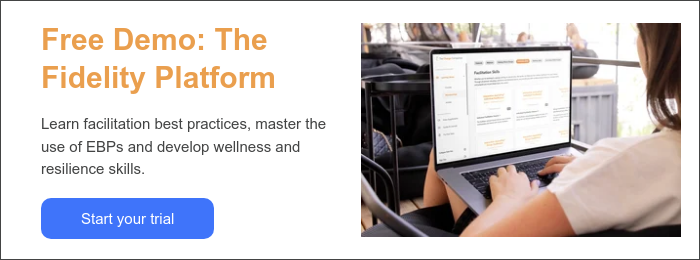Facilitation of Recovery Groups

September is National Recovery Month. This is a month to celebrate the hope and success stories that come with the process of recovery from substance use disorders. It is also an opportunity to highlight some best practices for supporting clients as they navigate the stages of change in recovery. As clinicians, case managers, counselors and treatment specialists, you play a key role in clients’ success.
Before facilitating a recovery group, you might start by doing a self-assessment. This includes reflecting on biases you may have toward substance use disorders or aspects of your participants’ identities. Then, reflect on your readiness to facilitate this particular group. This self-assessment can identify areas for learning and progress. Familiarize yourself with facts, research and statistics on these areas you identified. This may help you dismantle these biases and maintain the role of an impartial facilitator.
A key component to successful facilitation is active listening, as researched and described by Carl Rogers. Active listening is helpful in informing targeted, productive motivational interviewing questions. It can also help in understanding where an individual is along the stages of change in their recovery. Active listening, combined with motivational interviewing, can help identify key factors to the individual’s success together. Factors may include clinical treatment, medication-assisted treatment (MAT) and Interactive Journaling. It can also include peer or family support, community, faith, healthy coping strategies and a self-identified sense of purpose.
Another key component of an individual’s successful recovery is their access to resources. While national and digital resources can be helpful to an individual, it is the facilitator’s responsibility to help the individual identify local resources that can support their recovery. These resources may extend beyond those related directly to substance use. This may include access to transportation, healthcare, childcare, housing, employment and financial assistance.
Uncovering factors for success and identifying resources can increase a client’s likelihood of a successful recovery. However, as with any person navigating the stages of change, it’s possible to take steps backward in this process. Returning to use is common in substance use disorders, with 40-60% of individuals returning to use at some point in recovery. You may be able to successfully identify an individual’s risk of relapse before it occurs. This gives you the chance to redirect them on their path to recovery. You might do this by looking for changes in habits, encouraging the development of a recovery safety net and identifying ways the client can increase naturally occurring dopamine. Help the client identify a list of high-risk people, places and things that may influence a decision to return to use. You can also use specialized curricula and help the client develop a workable relapse prevention plan. Clients who share this relapse prevention plan with supportive people are more likely to avoid relapse.
If a client has returned to use, this doesn’t mean a failure in treatment. Rather, work together to facilitate a decisional balance. This weighs the client’s reasons to continue their use against their reasons to get back on track with their recovery. Targeted motivational interviewing questions can help the client reflect on the lessons they have learned in their recovery journey. You can also help them review and update their list of high-risk people, places and things. They may also benefit from making revisions to their relapse prevention plan.
The work that people like you do in supporting others on their recovery journeys comes with challenges, celebration, hope and resilience. National Recovery Month can be an opportunity for people in this field to take a moment to recognize the facets of recovery they get to play a role in.
Join us in celebrating the presence of progress, positive life change and success in recovery. Do you have a success story you’d like to share? Submit your story of change here.
Above all, thank you for the important work you do every day.



